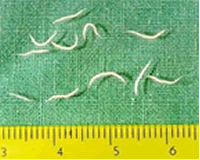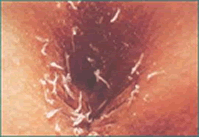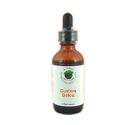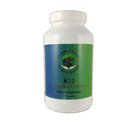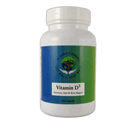|
|
Pinworm
The pinworm, also known as threadworm (in the United Kingdom) or seatworm, is a roundworm of the Enterobius genus. The pinworm has a worldwide distribution and is the most common parasitic infection in the United States and Western Europe. Pinworms are particularly common in children, with prevalence rates in this age group having been reported as high as 61% in India, 50% in England, 39% in Thailand, 37% in Sweden, and 29% in Denmark. Because it spreads from host to host through contamination, pinworms are common among people living in close contact, and tend to occur in all people within a household.
The surface of the eggs is sticky when laid and the eggs are readily transmitted from their initial deposit near the anus to fingernails, hands, night-clothing and bed linen. From here, eggs are further transmitted to food, water, furniture, toys, bathroom fixtures and other objects. Household pets often carry the eggs in their fur, while not actually being infected. Dust containing eggs can become airborne and widely dispersed when dislodged from surfaces, for instance when shaking out bed clothes and linen. Consequently the eggs can enter the mouth and nose through inhalation and be swallowed later. The eggs are hardy and can remain viable (i.e., infectious) in a moist environment for up to three weeks!
One third of individuals with pinworm infection are totally asymptomatic (have no symptoms). The main symptoms are itching in and around the anus and around the perineum. The itching occurs mainly during the night and is caused by the female pinworms migrating to lay eggs around the anus. The intensity of the itching varies and it can be described as tickling, crawling sensations, or even acute pain. The itching leads to continuously scratching the area around the anus, which can result in tearing of the skin and further complications such as secondary bacterial infections, including bacterial dermatitis (i.e., skin inflammation) and folliculitis (i.e., hair follicle inflammation). General symptoms are insomnia (i.e., persistent difficulties to sleep) and restlessness. A considerable portion of children suffer from anorexia (i.e., loss of appetite), weight loss, irritability, emotional instability, and enuresis (i.e., inability to control urination).
In women the pinworms may move onto the vulva and into the vagina, then moving to external orifice of the uterus, and onwards to the uterine cavity, fallopian tubes, ovaries, and peritoneal cavity. This can cause vulvovaginitis, (an inflammation of the vulva and vagina). This causes vaginal discharge and pruritus vulvae, (itchiness of the vulva).
|
|
|
 Arthropod/Vector
Bacteria
Chemicals
Fungus /Mold
/ Yeast Metals Parasites Virus Other
Arthropod/Vector
Bacteria
Chemicals
Fungus /Mold
/ Yeast Metals Parasites Virus Other
